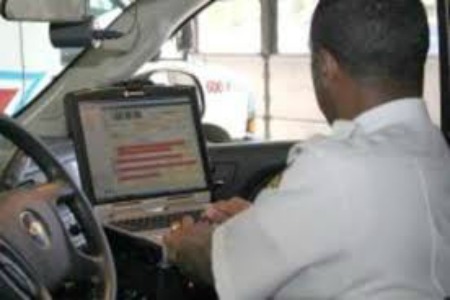
A friend of mine, who shall remain nameless, was recently stopped for a minor traffic violation. She had groaned at the sight of flashing blue lights in her rearview mirror, realizing that she must have been over the speed limit. Then she thought about what an ordeal getting the traffic ticket was going to be, recalling the last time she was pulled-over, when it took the officer more than 10 minutes to write on the ticket all of her personal identification information, including her name, address, and date of birth, as well as the location of the traffic violation stop. And, then, the officer had to go to his car and flip through a book to find the traffic code citation number. The officer had given my friend a handwritten traffic ticket and she surrendered her driver’s license as bail. But, adding insult to injury, my friend said the officer’s handwriting was illegible and it was almost impossible for her to understand what was written on the traffic ticket.
So my friend was bracing herself for the same frustrating experience at this recent traffic stop. Because she was already running late for an appointment, she felt this would make her even later. In addition, she dreaded the thought of not having her driver’s license for a long period of time. However, thanks to our Electronic Tickets (eTickets) system, which has been implemented by the Clerk’s Office for several Cook County municipalities, this time my friend had a much different experience. She said that once the officer pulled her over, he asked for her driver’s license and went to his squad car. Inside his car, the officer entered my friend’s driver’s license number into a computer, her name came up and, once selected, her personal information populated the fields of an electronic ticket. The officer then made selections from several dropdown menus, including date and time, location of the traffic stop, type of traffic violation, make and model of the car, and other required fields to complete the eTicket. It took less than two minutes before the officer printed the ticket from the portable printer in his patrol car. After signing the citation, he presented the eTicket to my friend. Since her offense was a court diversion traffic violation, she was given the eTicket and a court diversion envelope. A court diversion traffic violation means that my friend has the option to handle the ticket via the Internet, using the Clerk’s Office’s Online Traffic Ticket System (OTTS) to either plead guilty and pay her ticket; or plead guilty and register for Traffic Safety School; or plead not guilty and request a court hearing date to contest her traffic ticket. If my friend had received a “Must Appear” in court eTicket for a more serious violation, her ticket would have included her court date.
eTickets technology, introduced by the Clerk’s Office for Cook County law enforcement agencies in October 2011, is transforming the traffic ticket writing and handling process for traffic tickets in areas using the system. eTickets automates the process of creating, capturing, transmitting, and storing traffic-stop citation information from a police officer’s squad car to the Clerk’s Office. The Clerk’s Office initiated the eTickets pilot program in Bellwood, Crestwood, Matteson, and South Barrington, and, to date, 25 municipalities throughout Cook County are using the eTickets system.
Getting a traffic ticket is never pleasant, but eTickets makes the experience of getting a traffic ticket much more efficient, decreasing the length of time officers spend on individual traffic stops, and freeing up more time for them to spend protecting the public.
After an officer issues an eTicket to a driver, the officer retains a copy of the eTicket to give to the records clerk at his law enforcement agency. The records clerk verifies the data that has been transmitted to the agency from the patrol car’s computer with the information on the printed copy of the eTicket. Then the records clerk transmits the electronic data to the Clerk’s Office’s database. Within one business day, a court clerk can access the electronic ticket data as well as an image of the ticket; and that information is available if an individual calls the Clerk’s Office to inquire about the status of his or her ticket. When the Clerk’s Office receives a copy of the printed eTicket, a Traffic Division clerk verifies the traffic ticket and activates the ticket within the Clerk’s Office’s database as officially filed.
The electronic transmittal of traffic ticket information from an officer’s squad car to a law enforcement agency and to the Clerk’s Office eliminates redundant data-entry and significantly reduces the opportunity for human error in inputting critically important details.
The improved accuracy and efficiency delivered by eTickets is vital to the Cook County traffic system in light of our high volume of traffic violations. In 2013, the Clerk’s Office received 800,825 traffic violation tickets, and 601,769 of those violations required a Traffic Court hearing.
In the end, although my friend was still not happy about getting a traffic ticket, she could not help but praise the efficiency of the new eTickets process. Thanks to our new eTickets system, my friend was on time for her meeting, paid her traffic ticket online, and was able to get her driver’s license back in no time.
Hon. Dorothy Brown is the Clerk of the Circuit Court of Cook County, Illinois. For more information, visit www.cookcountyclerkofcourt.org. Email us at clerkofcourt@cookcountycourt.com. Like us on Facebook.com/cookcountyclerkofcourt. Follow us on Twitter@CourtClerkBrown.

